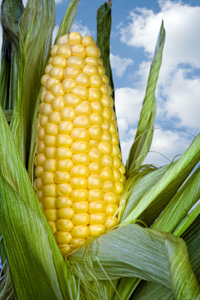We’ve seen the commercials that attempt to disperse negative reputation of high fructose corn syrup (HFCS) conveniently produced by the Corn Refiners Association and we’ve read the studies that vehemently protest consumption of it. So what’s the truth? What does the research say? What do you believe? The following is a brief summary as well as my opinion on the HFCS issue.
Let’s start with a definition. High fructose corn syrup is a sweetening agent added to processed foods where some glucose is changed to fructose (two types of sugar). At the end of the processing, both fructose and glucose are present. HFCS is chemically similar to table sugar, which we’ve been using as an “added sugar” sweetener for years. Is HFCS worse for you than table sugar? Is it correlated with obesity? Does it cause it?
Research Summary
Much of the research done on the topic shows indecisiveness of the effects of HFCS on weight. Older studies found that when subjects consumed higher amounts of sweetened drinks, like sodas, they gained more weight. More recent studies however, say that HFCS isn’t particularly to blame for the high rates of obesity. Princeton University found that rats that were given HFCS gained much higher amounts of weight than those rats that were given table sugar, even though they consumed identical calorie amounts. The HFCS rats also had higher rates of triglycerides, or ‘blood fats’. Long-term studies bring up the prevalence of another dangerous condition, metabolic syndrome. Gaining, almost 50 percent more weight than rats eating a normal diet, metabolic syndrome and obesity were at an all time high.
Another small study found that fructose changes levels of leptin and ghrelin (appetite hormones) that can make it difficult to manage weight in the long term. In recent decades the Centers for Disease Control has seen unprecedented amounts of obesity. The research jury is still out. For those who aren’t familiar with research… it is common for contradicting studies to come out and for researchers to conclude that “more work needs to be done.” A researcher’s job is never done.
My Opinions on HFCS and Balanced Eating
I’ve formed my opinion on HFCS by reading research, books, discussions with colleagues, and my own experience evaluating eating plans of my clients.
There’s a lot we don’t know about causes of obesity. We know there is not one cause. One thing we do know is foods containing HFCS or table sugar could easily be replaced with more nutritious options in a healthy eating plan. Instead of a soda, sparkling water or milk could be consumed. Many kids do not get the recommended three dairy servings a day. Instead of a packaged pastry, whole wheat toast with almond butter and a banana would make a better breakfast or snack.
In the end, HFCS is an added sugar that needs to be consumed sparingly. It does not naturally occur in whole foods like nuts, fruits, vegetables, milk, beans/legumes, avocados… and… well, you get the idea. HFCS is cheap, thanks to corn subsidies and frankly, it works for the food industry so it winds up in unhealthy foods and seemingly healthy foods like sweetened yogurts and bread. All added sugars add calories with little nutrition, which can lead to weight gain if over-consumed. Since more than 70 percent of Americans aren’t getting their daily fruits and vegetables, there is an obvious disconnect between what is good for us, what we “should” do, and what we actually do.
In order to get “too much” HFCS, you’d have to have a junk food diet (there is a “safety” limit of fructose of 90 grams a day). Eating loads of processed foods also leaves you devoid of essential nutrients. Your energy will be low and you’ll feel like crap. So rather than worry about HFCS as an ingredient, look at the big picture. Are you eating healthy? I always tell clients to use added sugars in a way that makes healthy food taste better. For example, a hot bowl of oatmeal made with skim milk, toasted walnuts, dried cherries, and a touch of brown sugar…. MMMM…. Or have you had a salad with a sweet poppy seed dressing? It’s delish!
The good news if you don’t want to wait for the research, you can find products without high fructose corn syrup. Many breads are now promoting that they don’t use it and I am sure other processed foods will follow. Don’t give them an automatic health halo because all sugars matter… but if you want to avoid it, you can. It’s your choice. Consumer freedom.
So… lemme have it. What do you think?
